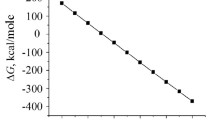Conclusions
In the process of boriding, silicon is forced into the transition zone and has an inhibiting effect on the growth of the high-boron phase (FeB) and the layer of borides, leading to a change in the phase composition of this zone.
Similar content being viewed by others
Literature cited
I. S. Dukarevich, and M. A. Balter, in: Protective Coatings on Metals [in Russian], Naukova Dumka, Kiev (1967).
Gosio Katarigi, Keko Fudzin, and Nagidziry Takamoto, J. Japan Inst. Metals,32, No. 7 (1967).
G. Z. Koval'chuk et al., in: Collection of Reports of the Central Scientific-Research Institute of Ferrous Metallurgy [in Russian], No. 38, Moscow (1970).
V. T. Cherepin and Yu. P. Maifet, Pribory i Tekh. Éksperim., No. 5 (1971).
Additional information
Kiev Polytechnical Institute. Translated from Metallovedenie i Termicheskaya Obrabotka Metallov, No. 3, pp. 67–68, March, 1973.
Rights and permissions
About this article
Cite this article
Permyakov, V.G., Yakovchuk, Y.E., Cherepin, V.T. et al. Effect of silicon on formation of boride coatings. Met Sci Heat Treat 15, 251–253 (1973). https://doi.org/10.1007/BF00648168
Issue Date:
DOI: https://doi.org/10.1007/BF00648168




